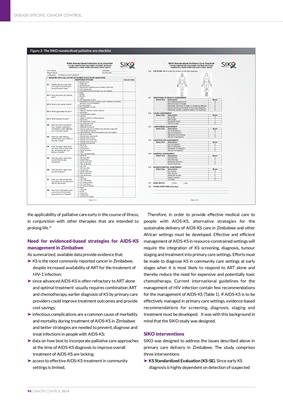
lesions by clinical examination, the KS-SE (Figure 1) was
designed as a simple examination tool that focuses on
improving bedside diagnostic skills to assess the common
clinical presentation of KS disease by thorough physical
examination of the skin, mouth, internal organs and
lymphatics. Information collected as part of the KS-SE will
be recorded on a KS-SE flow sheet, which will serve as a
written record for future reference in the clinical
management of the patient by primary care providers and
consultants.
‰ Palliative care education and integration of palliative
care into primary care of people with AIDS-KS. SIKO will
implement a training programme for all levels of primary
care providers (doctors, nurses and allied health
professionals) involved in the clinical assessment and
management of AIDS-KS at the study sites. This will take
place in conjunction with the KS training programme
already being conducted. A palliative care checklist was
designed in order to help site staff assess the specific
palliative care needs of any patient diagnosed with KS
(Figure 2). Staff will also be trained in the use of a
standard quality of life questionnaire which has been used
extensively in other studies of KS in Zimbabwe (Functional
Living Index in Cancer FLIC).
‰ KS management strategy. An algorithm-based KS
management strategy will be developed together with
other materials to increase awareness and to educate the
community and health providers (Figure 3). Advanced KS
disease (T1 stage) will be managed in consultation with KS
specialists at UZCHS. Patients who live in or near Harare
will be referred to the Parirenyatwa KS Clinic for further
evaluation. Currently, general care for HIV-infected
patients is free in government institutions (this includes
out-patient clinic consultations, cotrimoxazole prophylaxis
and antiretroviral therapy); this does not include
chemotherapy for which patients are charged separately
as are all patients with AIDS-related and non-AIDSrelated cancers. Patients
in rural areas will be managed
through long-distance mobile telephone consultations
between primary care providers and specialists at UZCHS.
The mobile KS consultations (with digital photographs as
necessary) will allow KS consultants to assess patients
directly in collaboration with the primary care provider
and institute early chemotherapy if needed, to improve KS
outcomes. Moreover, mobile specialist consultations will
strengthen lines of communication between consultants
and primary care providers and will provide the
opportunity for further dissemination of knowledge
related to AIDS-KS care to primary care providers. The
mobile telephone system in Zimbabwe is well developed,
and its use is feasible and affordable; there is no record of
prior experience in using this strategy for distance
consultation for management of AIDS-KS in a rural setting
in Africa.
The SIKO strategy will be algorithm-based so that it will be
easily integrated into current Ministry of Health, PEPFAR and
WHO training guidelines and the national Zimbabwe
guidelines. Since the WHO Integrated Management of
Adolescent and Adult Illness (IMAI) for first level facility
health workers is being used in many countries in sub-Saharan
Africa, if the SIKO strategy is successful it will be easily
adapted into IMAI guidelines assuring rapid dissemination and
impact on AIDS-KS care.
The effectiveness of the SIKO interventions will be
evaluated in a community-based clinical trial with randomized
step-wedge design.29 Each of the eight urban and rural sites
will be randomized to begin their interventions at different
time points. The total length of the study will be 156 weeks
and the total evaluation period (monitoring and intervention
period) will be 102 weeks (2 years). More details on
the clinical trial design are available on clinicaltrials.gov
(clinicaltrials.gov Identifier: NCT01764360).
DISEASE-SPECIFIC CANCER CONTROL
CANCER CONTROL 2014 95
Figure 3: An information poster to raise awareness of Kaposi sarcoma